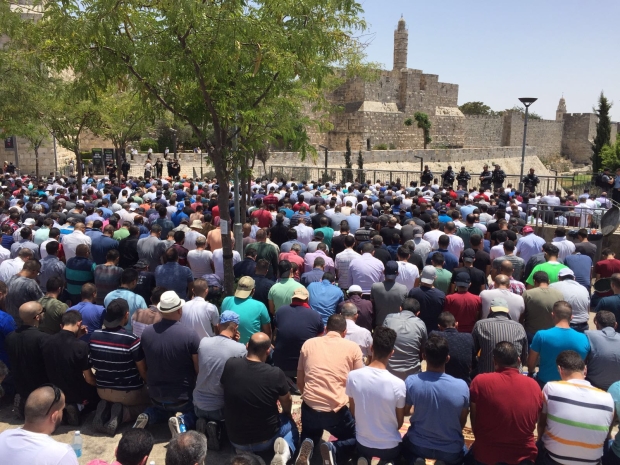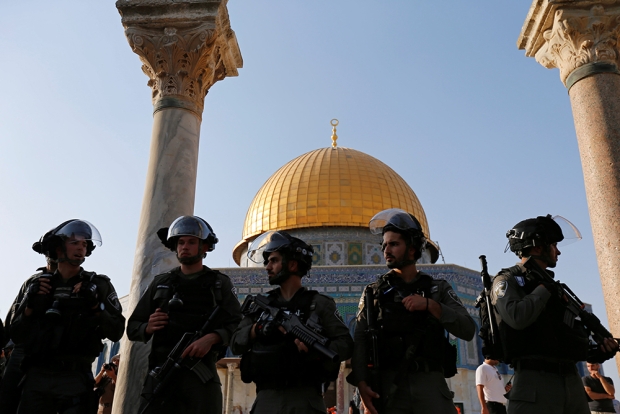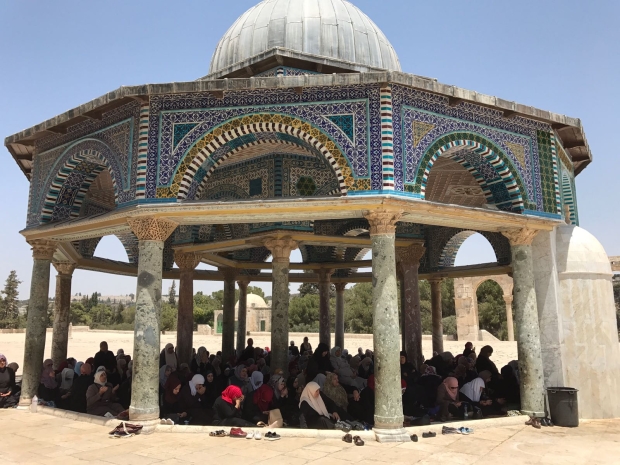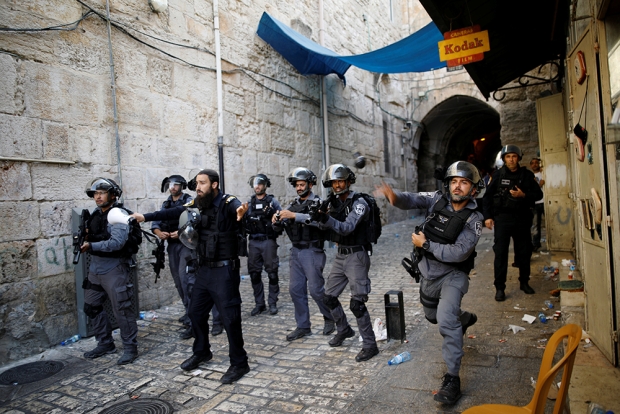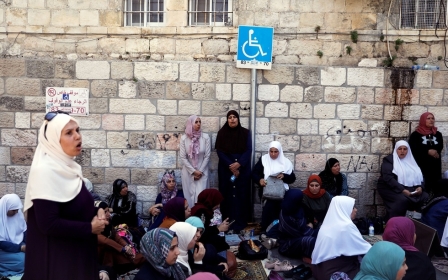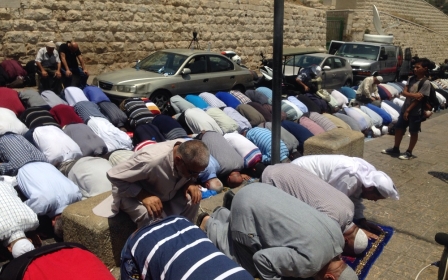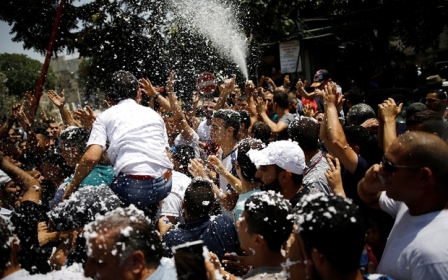Al-Aqsa prayers end with little violence as deadly clashes erupt elsewhere
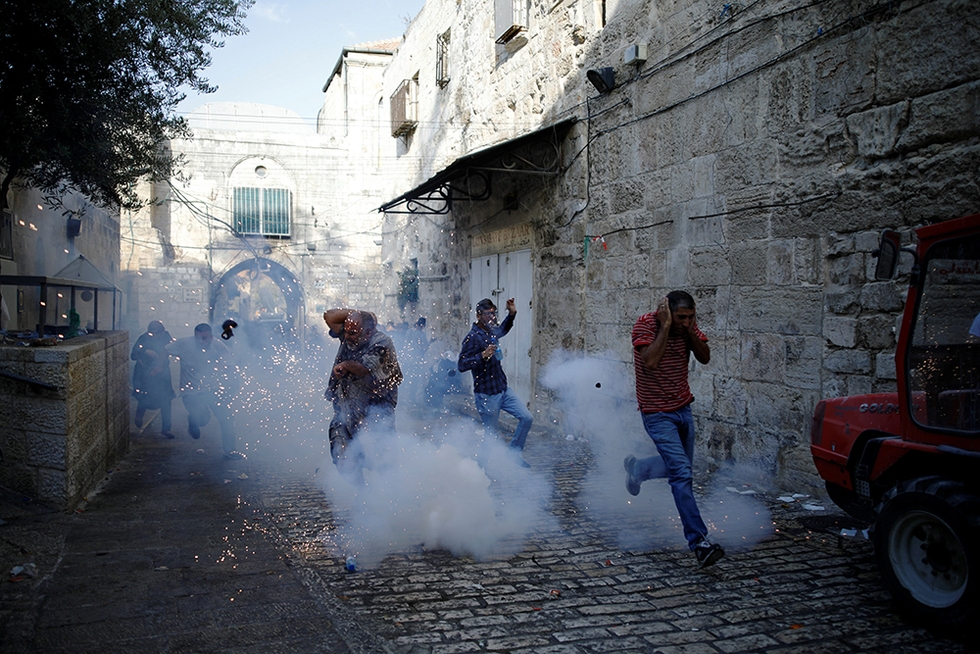
The main prayer session at Jerusalem's Al-Aqsa mosque ended relatively calmly on Friday after Israel withdrew tougher security measures that had prompted two weeks of violent Palestinian protests, although it barred entrance to men under age 50.
Extra police stood guard throughout Jerusalem's walled Old City, some wearing riot gear, some on horseback, in anticipation of mass protests even after Israel bowed to international pressure and removed metal detectors outside Al-Aqsa.
But only brief, isolated clashes between Palestinian protesters and Israeli police took place there, without serious incidents.
However, tensions remained high and more serious violence erupted in the Israeli-occupied West Bank and the Gaza Strip.
Two Palestinians were killed by Israeli security forces in Gaza and the occupied West Bank on Friday as protesters clashed with Israeli police.
One of the two victims was shot dead after attempting to stab Israeli soldiers at a junction near Bethlehem in the occupied West Bank, the Israeli army said.
The incident occurred at the Gush Etzion junction near a large bloc of Israeli settlements in the West Bank. No soldiers were reported wounded.
The other victim, identified as 16-year-old Abdelrahman Abu Hmeisa, was shot dead by Israeli police in clashes east of the Al-Bureij refugee camp in the central Gaza Strip, said the health ministry of the Hamas movement, which rules the enclave.
Meanwhile, the Red Crescent confirmed that 225 people were hurt in Jerusalem and the West Bank during recent clashes.
Israeli-Palestinian tensions have been high over the last couple weeks amid the dispute over the sensitive Jerusalem holy site.
Despite Palestinians being able to enter the mosque after two weeks of protests, worshippers told MEE they felt sad as hundreds of others were forced to pray outside after being barred from entry.
During Friday's sermon, the imam leading the prayers told people to stand for Al-Aqsa and to remain despite "human rights abuses that have been perpetrated by the Israelis".
Israeli police earlier on Friday had barred men under 50 from entering al-Haram al-Sharif, or Noble Sanctuary, also known as the Temple Mount, where Al-Aqsa mosque is located, but that restriction was lifted hours later.
Meanwhile, checkpoints and Israeli police in riot gear were in place across the Old City as worshippers concluding their prayers in and around Al-Aqsa mosque.
Speaking to MEE after the Friday sermon, Mera al-Kurd, a student and resident of the Old City, called on the international community to show its support for the Palestinians in Jerusalem.
"It makes no sense that we are unable to pray peacefully in our holy place of worship. The international community must take action to stop this injustice from continuing."
'What happened today is intended to exact revenge on worshippers'
- Al-Aqsa's director, Omar Kiswani
Police deployment
About 200 Israeli police were inside the Noble Sanctuary on Thursday night, removing Palestinians who lingered as clashes raged. Some were arrested or injured, and Israeli forces prevented medical access.
A young Palestinian man from the village of Hizma, outside Jerusalem, died on Thursday night. He was shot by Israeli forces three days earlier while protesting against the Al-Aqsa situation, and is the fifth Palestinian slain in this latest round of violence.
100 injured as Israeli police storm Old City
On Thursday, the Palestinian Red Crescent said about 100 people were wounded inside the Al-Aqsa mosque compound and in adjacent areas of the Old City. Israeli police said stones had been thrown at officers inside the compound.
Thousands of worshippers earlier streamed into the compound for afternoon prayers for the first time in two weeks, ending a boycott after Israel removed the security measures, installed after a 14 July attack killed two policemen.
Some brought their children in what was initially a celebratory atmosphere.
Muslims had in previous days refused to enter the compound and prayed in the streets outside after Israel installed the security measures.
Palestinians viewed the move as Israel asserting further control over the site.
Israeli authorities said the measures, including metal detectors, were needed because the 14 July attackers smuggled guns into the compound and emerged from it to attack the officers.
The United States welcomed "the efforts undertaken to de-escalate tensions in Jerusalem today".
"Calm and security will create the best opportunity to return to dialogue and the pursuit of peace," US President Donald Trump's special representative for international negotiations, Jason Greenblatt, said.
Rare Palestinian victory
Deadly unrest erupted in the days after the security measures were introduced, with clashes breaking out around the compound and in the occupied West Bank.
A Palestinian also broke into a home in a Jewish settlement in the West Bank and stabbed four Israelis late last Friday, killing three of them.
After intensive international diplomacy, Israel removed the metal detectors on Tuesday.
Newly installed railings and scaffolding where cameras were previously mounted were also removed early on Thursday.
The removal was seen as a defeat for Israeli Prime Minister Benjamin Netanyahu, who had ordered the new security measures and was forced to backtrack after warnings the unrest could spiral out of control.
It represented a rare victory for Palestinians, who remained united in their boycott.
Al-Aqsa's director, Omar Kiswani, had told Middle East Eye that he expected the clashes on Friday. "I think the occupation forces want to escalate and unleash violence on peaceful worshippers," he said.
"What happened today is intended to exact revenge on worshippers and protesters who came to pray at Al-Aqsa."
The Israeli media were scathing in their criticism of Netanyahu, as even right-wing newspapers normally supportive of the premier ripped into him.
"Bibi's big bungle” was the headline of a front-page analysis in the normally Netanyahu-friendly Jerusalem Post, using the premier's nickname.
Netanyahu "failed, tried to avoid the punishment he deserved, and ended up with not only that punishment but also paying additional penalties," the paper said.
Smart cameras
Israeli officials had said they were to replace the new security measures with "advanced technologies" - widely believed to be smart cameras with facial recognition technology.
Cameras are already widespread in Jerusalem's Old City.
Jordan is the custodian of Muslim holy sites at the compound, and King Abdullah had called on Netanyahu to remove the security measures.
The Palestinian information minister, Mohammad al-Momani, on Thursday welcomed their removal, calling it an "essential step towards calm".
Jordan's king also called on Thursday for an Israeli security guard at Israel's embassy in Amman to face trial over the killing of two Jordanians on Sunday.
The guard shot dead a 17-year-old Jordanian who attacked him with a screwdriver, according to Israeli officials. Another Jordanian was also killed, apparently by accident.
The guard was allowed to return to Israel on Monday, after a deal said to involve the holy site, but Netanyahu's embrace of the guard as a hero angered Jordanian officials.
Agencies also contributed to this report.
Stay informed with MEE's newsletters
Sign up to get the latest alerts, insights and analysis, starting with Turkey Unpacked
Middle East Eye delivers independent and unrivalled coverage and analysis of the Middle East, North Africa and beyond. To learn more about republishing this content and the associated fees, please fill out this form. More about MEE can be found here.


